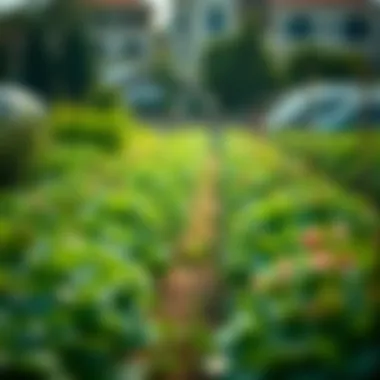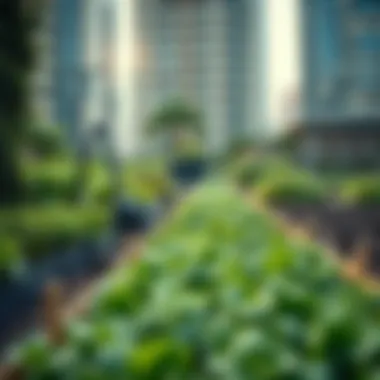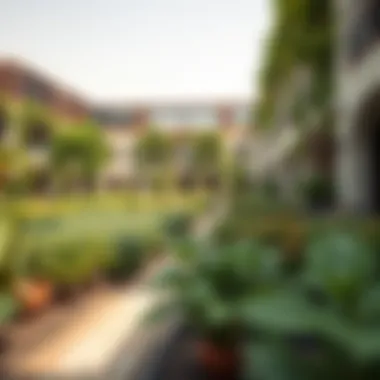Farm Gardens in Emaar: A Green Oasis in Dubai


Intro
In recent years, Dubai has seen a growing trend towards sustainable living, with an emphasis on enhancing urban spaces through the integration of green areas. Particularly noteworthy is Emaar's focus on farm gardens within its developments. These gardens are not merely patches of greenery; they embody a holistic approach to community living, seamlessly blending agriculture with architecture. Such spaces can foster a sense of community, promote sustainable practices, and offer invaluable benefits to property values.
This article aims to shed light on the various dimensions of farm gardens in Emaar's projects. We'll discuss how these gardens enhance not just the aesthetic appeal of the neighborhoods but also their ecological footprint. From the types of gardens found in these developments to their role in urban planning, we're set to uncover the many layers of these spaces.
Furthermore, we will look into how farm gardens can elevate the lifestyle of residents while also attracting potential investors and buyers. The rising interest in sustainable practices and quality of life factors means that these gardens are becoming increasingly relevant in today’s property market.
Let’s embark on a detailed exploration of farm gardens in Emaar developments and discover the untapped potential they hold for urban living in Dubai.
Prolusion to Emaar Developments
Understanding the landscape of urban living in Dubai requires a closer look at Emaar Developments, which stands as a titan in the real estate sector. Their developments are not just buildings; they are a blend of sustainability and innovative design, paving the way for modern living. This article aims to shed light on Emaar's unique approach that incorporates farm gardens into their projects.
Farm gardens represent a shift towards sustainable urban living, an idea that resonates well within Emaar’s vision. These green spaces not only contribute to aesthetics but also provide essential ecological benefits, improve community wellbeing, and consolidate the urban environment’s relationship with nature. For investors, knowing how these elements play a role in property values acts as a compass for future investments. In an era where urbanization is often critiqued for its environmental impact, Emaar spearheads initiatives that integrate greenery, urging a reconnection with the earth, even in bustling Dubai.
Overview of Emaar Properties
Emaar Properties, founded in 1997, has grown rapidly to become one of the largest real estate developers in the Middle East and beyond. Noteworthy projects like the Burj Khalifa and The Dubai Mall are testaments to its innovative spirit and commitment to excellence. Emaar is known for creating entire communities, spaces that resonate with people and encourage social interaction.
Each project is crafted with meticulous attention to detail, factoring in modern amenities and lifestyle requirements. The integration of farm gardens showcases Emaar’s forward-thinking approach. These gardens add a layer of livability, enhancing the appeal of residential and commercial spaces alike. In a world increasingly aware of its carbon footprint, Emaar leads by example, creating developments that embody both luxury and responsibility.
Emaar's Vision for Sustainable Urban Living
Emaar’s vision is rooted in sustainability. It emphasizes development that meets the needs of current generations without compromising the ability of future generations to meet theirs. This philosophy translates into real-world applications, particularly visible in how they integrate green infrastructure into their projects.
Farm gardens in Emaar's developments serve multiple purposes:
- Enhancing biodiversity by providing habitats for various species.
- Promoting a sense of community, where residents can engage in nurturing plants together.
- Boosting mental health through access to green spaces, which have been shown to reduce stress and improve overall well-being.
By designing developments that include these gardens, Emaar not only enriches the lifestyle of its residents but also contributes to the global dialogue on sustainability. The benefits ripple through the community, making Emaar not just a real estate developer but a leader in the shift towards greener living.
"Sustainable urban living isn’t just a trend; it’s a necessity in today’s rapidly expanding cities. Emaar recognizes this and is actively working towards creating environments that prioritize people and the planet."
Understanding Farm Gardens
Understanding farm gardens in the context of Emaar Developments is crucial for grasping how these green spaces contribute to sustainability and urban living. Farm gardens not only represent a shift towards more organic and local food sources but also embody a movement towards integrated, eco-friendly communities. This transformation lands squarely within Emaar’s mission to create developments that harmonize with nature, fostering a healthier environment for both residents and wildlife.
The importance of farm gardens extends far beyond aesthetic appeal; they provide tangible benefits to both the community and the economy. Having a farm garden in a residential area can enhance property values, promote community engagement, and support local biodiversity. The space where people grow their vegetables or herbs becomes a platform for community building, where neighbors meet, share experiences, and even swap gardening tips.
Farm gardens also serve educational purposes. Engaging with agriculture allows residents, particularly children, to learn about where food comes from, which instills values of sustainability and responsibility towards the environment. This learning experience is invaluable in a society that often seems disconnected from the origins of their food.
"Bringing farming to the urban landscape transforms gray to green, making life a little sweeter, and a touch healthier."
Defining Farm Gardens
When we refer to farm gardens, especially in the framework of Emaar Developments, we’re talking about cultivated spaces designed for the growing of food and plants within an urban setting. Farm gardens can take various forms – from community plots shared by residents to private gardens attached to individual residences. The key aspect here is that these gardens are not merely ornamental; they are functional, aimed at producing food while enhancing the livability of urban areas.
Farm gardens usually encompass a range of plants, from vegetables and herbs to flowers that attract pollinators. These gardens can also incorporate sustainable practices like permaculture, organic farming, and companion planting, which all contribute to an ecosystem that supports both plant and animal life.
Historical Context of Urban Agriculture
Urban agriculture is not a novel concept; it has existed for centuries in various forms across cultures. In cities around the world, especially during times of economic downturn or food scarcity, residents have turned to urban gardening as a way to ensure food security. Historical examples of urban agriculture include the victory gardens during World War II, where citizens grew food in their yards to supplement rations.
In recent years, the practice has witnessed a resurgence as concerns over food quality, transport emissions, and sustainability have emerged. In the context of Emaar, urban agriculture aligns with the broader strategy of creating smart, sustainable cities that not only address housing needs but also foster lifestyle choices that enhance well-being. The historical context provides a vital backdrop for understanding how far urban agriculture has come, and its immense potential within contemporary urban landscapes, notably those being developed by Emaar.
Types of Farm Gardens in Emaar
The concept of farm gardens in Emaar developments represents a shift towards a more sustainable and self-sufficient urban ecosystem. This section explores the various types of farm gardens that are sprouting up in these vibrant communities, each playing a crucial role in enhancing the quality of life for residents while also contributing to environmental sustainability. Understanding these types is essential for investors, buyers, and urban planners seeking to capitalize on the benefits these green spaces yield.
Community Gardens
Community gardens serve as an excellent initiative to promote collaboration and a sense of belonging among residents. These gardens provide a shared space where individuals together cultivate vegetables, herbs, and flowers. They are not purely about planting; they’re about fostering community spirit. Often, these gardens are organized by residents who unite to set goals and design the garden layout.


Benefits of community gardens extend beyond merely growing food. They:
- Improve access to fresh produce, especially in urban areas where grocery stores may not provide quality options.
- Promote healthy eating habits as participants are often more inclined to consume what they've grown.
- Act as social hubs, where neighbors meet, share knowledge, and engage in communal activities.
Moreover, community gardens also encourage biodiversity while supporting pollinators like bees and butterflies, crucial for ecological health.
Private Gardens
Private gardens in Emaar developments offer residents personal havens within the bustling city. These small parcels of land—often adjoining individual homes or townhouses—allow residents to cultivate their private vegetable patches or serene flower beds at their leisure. The appeal of having a garden is not limited to aesthetics; it plays a significant role in enhancing mental well-being. The act of gardening can be remarkably therapeutic, providing a peaceful retreat where one can connect with nature.
When planning a private garden, several factors come into play:
- Space Utilization: Maximizing smaller plots or utilizing innovative plant arrangements.
- Sustainable Practices: Incorporating methods such as composting, water-efficient practices, or native plant species that require less maintenance.
- Personal Goals: Whether it's a family project or simply enjoying the tranquillity, private gardens can be tailored to reflect the residents’ aspirations.
Rooftop and Vertical Gardens
As urban spaces grow denser, rooftop and vertical gardens have emerged as creative solutions to limited ground space. In Emaar developments, these gardens encapsulate the essence of innovative urban agriculture and sustainability. Rooftop gardens transform unused space into lush oases, often providing stunning views alongside environmental benefits.
Vertical gardens, where plants grow on wall-mounted systems, are especially appealing for high-rise buildings. They maximize space while also creating stunning visual effects. The benefits of these gardens are numerous:
- Temperature Regulation: They can significantly reduce the urban heat island effect, keeping buildings cooler and reducing energy costs.
- Air Quality Improvement: Plants help filter pollutants from the air, contributing to a healthier urban environment.
- Aesthetic Appeal: Providing green views where concrete reigns supreme enhances overall aesthetics and may increase property value.
By integrating these types of gardens into Emaar developments, the potential to reshape urban living becomes a tangible reality. They not only stir interest among residents and owners but also draw attention from environmental advocates and urban planners alike.
"Integrating green spaces in urban areas isn’t just about aesthetics; it’s about enriching lives and promoting sustainability."
In summary, the various types of farm gardens in Emaar developments showcase how urban living can align with natural beauty and function. They’re not just spaces for plants but vital assets for community building, personal well-being, and environmental health.
Design Principles of Farm Gardens
Designing farm gardens within Emaar’s developments isn’t just about selecting a patch of land and throwing some seeds in the ground. It is a carefully orchestrated endeavor that takes into consideration multiple elements that work in harmony to create not only beauty but sustainability and functionality. These gardens serve as vibrant green lungs amidst the concrete jungles, offering residents a piece of nature right at their doorstep. Understanding these design principles is crucial, as they reveal how such spaces can enrich the lives of community members, enhance biodiversity, and promote environmental responsibility.
Sustainable Design Practices
When it comes to sustainable design practices, farm gardens in Emaar developments utilize an eco-friendly approach that can transform any urban environment. These practices often include:
- Use of Native Plants: Employing flora that naturally thrive in the region reduces water usage and maintenance needs. This aligns perfectly with Emaar's vision of sustainability, ensuring gardens are both practical and aesthetically pleasing.
- Composting Systems: Incorporating composting systems not only reduces waste but also enriches soil health. This circular approach to gardening ensures that organic materials are returned to the earth, fostering a self-sustaining ecosystem.
- Rainwater Harvesting: Capturing and utilizing rainwater is another innovative practice used in these gardens, providing an additional water source while decreasing the overall demand from municipal systems.
- Permaculture Techniques: Implementing permaculture principles allows for the design of gardens that mirror natural ecosystems, promoting biodiversity and resilience within urban settings.
These sustainable practices highlight a commitment to preserving the environment and ensuring that these green spaces can flourish for generations to come. With thoughtful design practices, farm gardens become more than just a green spot; they evolve into vital components of sustainable urban living.
Integrating Farm Gardens into Urban Spaces
Successfully incorporating farm gardens into urban spaces requires a nuanced understanding of both the natural environment and the built surroundings. It’s about creating synergy between these two elements. Key considerations for integration include:
- Accessibility for Residents: Gardens should be designed with accessibility in mind. Pathways, seating areas, and educational signage can enhance user experience, inviting residents to engage with their gardens on multiple levels.
- Zoning and Usage: Thoughtful zoning helps define areas for communal activities, individual gardens, and ecological landscaping. This can foster community interaction while also allowing for personal gardening experiences.
- Visual and Aesthetic Appeal: Aesthetic design matters. Integrating art installations or using color-coordinated planting can elevate the visual charm of a farm garden, making it an integral part of the urban landscape.
- Functionality: The garden must be functional, serving various purposes—be it a place for relaxation, education, or social gatherings. Including raised beds, vertical gardens, and event spaces can maximize the potential of these areas.
Integrating farm gardens thoroughly into urban designs not only beautifies the area but also strengthens community ties by creating functional, joyful spaces for gathering and learning. This approach is especially resonant in Emaar’s ethos, aiming to cultivate community spirit in its developments.
"The true beauty of any urban garden lies in its ability to bridge nature and community, transforming concrete landscapes into vibrant ecosystems that nurture both people and the planet."
Benefits of Farm Gardens
Farm gardens offer a plethora of advantages that tie deeply into the fabric of urban living, particularly within Emaar’s developments in Dubai. They serve as essential green spaces, enhancing not just aesthetics but also the quality of life for residents and the broader ecosystem. Understanding the benefits of these gardens is crucial for investors, buyers, developers, and anyone focused on sustainable living.
Enhancing Biodiversity
The construction of farm gardens directly contributes to increasing biodiversity in urban settings. These spaces are not just patches of greenery; they attract various species of birds, butterflies, and beneficial insects like bees. For example, a well-planned garden in an Emaar community can become a habitat for more than just a few plants. Residents might find birds nesting in trees, or bees pollinating vegetables and flowers.
The concept of biodiversity extends beyond merely having a variety of species present. It involves creating a balanced ecosystem where different organisms can thrive. This is crucial because diversity within a garden can lead to healthier plants and reduce the need for harmful pesticides.
- Native Plant Integration: Including local flora not only supports local wildlife but also ensures that plants are better adapted to the region's climate.
- Pollinator Friendly Practices: By consciously planting flowers that attract pollinators, farm gardens become vital links in maintaining ecological balance.
As the urban landscape of Dubai continues to evolve, fostering biodiversity is paramount. Farm gardens create one small but significant piece of a larger ecological puzzle.
Promoting Mental Well-being


Urban living often comes with its own set of challenges, from the hustle and bustle of daily commutes to the incessant noise of city life. Farm gardens present a serene escape from these stresses, promoting mental well-being among residents. The therapeutic effects of gardening have been documented quite extensively. Engaging with nature provides a psychological boost; it can reduce feelings of anxiety and depression.
- Mindfulness Through Gardening: Planting seeds and nurturing them allows residents to practice mindfulness. This peaceful activity fosters a connection with nature and can serve as an effective stress-reliever.
- Physical Activity: Gardening is inherently physical. Whether it’s digging, planting, or harvesting, these tasks contribute to physical health while also promoting emotional resilience.
Farm gardens, by mere virtue of their existence, foster an environment conducive to well-being. It isn't just about growing food; it's about cultivating happiness in everyday life.
Creating Community Cohesion
Farm gardens have become facilitates for generating community interaction. They’re not merely private spaces; they can serve as communal hubs where neighbors come together. When individuals participate in community gardens, they share resources, knowledge, and even produce.
- Collaborative Efforts: Residents can share responsibilities, plant different crops, or even host swap events where they exchange produce, skills, and gardening knowledge.
- Educational Opportunities: These gardens are perfect venues for workshops, teaching various gardening techniques or sustainable practices. This leads to a stronger sense of ownership and pride in their living space.
"A community that gardens together grows together."
By cultivating community cohesion, farm gardens contribute to deeper social networks among residents. Such connections help build resilient communities that support each other in various facets of daily life.
In summary, the benefits of farm gardens extend far beyond their charming aesthetics within Emaar’s developments. They enhance biodiversity, promote mental health, and solidify community ties, thus elevating the overall quality of urban living in Dubai.
Economic Impacts of Farm Gardens
Farm gardens are more than just patches of greenery in urban settings; they are powerful economic catalysts, particularly within Emaar developments. These gardens influence multiple aspects of the real estate landscape and the wider community. An in-depth understanding of how farm gardens can enhance property values, attract residents, and bolster local economies is essential for investors and stakeholders keen on maximizing their investments.
Increasing Property Values
Communities with farm gardens often see a notable increase in property values. Buyers today aren't just looking for a roof over their heads; they desire a home that offers a holistic lifestyle. Research indicates that properties adjacent to green spaces typically command higher prices. Emaar’s farm gardens serve as a beautification point, directly enhancing the aesthetic appeal of neighborhoods.
Property buyers value close proximity to greenery as it promises a serene living environment. This proximity often translates into a higher resale value. Investors should consider that striking designs of farm gardens can create a desirable atmosphere, fostering a sense of place that’s hard for buyers to resist. Not only do these gardens add an air of luxury, but they also act as an investment safeguard in uncertain economic climates.
Some reports have shown that homes located within a quarter-mile of park-like amenities can be valued up to 20% more than comparable homes situated farther away. This makes farm gardens an attractive focal point for developers wanting to boost their project’s marketability while also contributing positively to community welfare.
Attracting New Residents
Farm gardens are powerful magnets for attracting new residents, particularly those who prioritize sustainability and community engagement. Modern buyers, especially millennials and Gen Z, are keen on living in communities that embrace eco-friendliness and promote healthy, organic living. According to recent surveys, over 70% of prospective buyers express a desire for properties that support green initiatives.
The incorporation of farm gardens within Emaar developments signals a commitment to sustainable urban living. As more people become aware of the advantages of growing their own food and supporting local ecosystems, the appeal of these developments increases. The social aspect of farm gardens also cannot be overlooked. These gardens foster community interaction, providing a sense of belonging and creating social networks. Potential residents often see this as a vital part of their living experience, enhancing the attraction of the community.
Furthermore, farm gardens can lead to new opportunities for local businesses. As residents engage with these spaces, they may find themselves drawn to nearby markets, cafes, and retail spaces, all benefitting from the increased foot traffic.
"Investments in green spaces yield returns beyond monetary value; they create thriving communities intertwined with nature."
In summary, the economic impacts of farm gardens within Emaar developments are profound. By enhancing property values and attracting new residents, these gardens not only beautify urban spaces but also strengthen the local economy and foster community spirit. Stakeholders should keep a keen eye on the trends surrounding farm gardens since they represent a unique intersection of real estate opportunity and sustainable living.
Challenges and Solutions
Understanding the challenges and solutions presented by farm gardens is crucial for anyone involved in real estate, urban design, or community development. As Emaar continues to lead in integrating green spaces, it is vital to address the obstacles these gardens face. Not all that glitters is gold; challenges tend to pop up like weeds in a thriving garden.
Land Use Conflicts
One of the foremost challenges in establishing farm gardens within urban developments is land use conflict. The very land that could be utilized for vibrant gardens often competes with other priorities, such as commercial buildings and residential spaces. In a bustling city like Dubai, where every square inch holds value, decisions on land allocation can rise faster than the height of the Burj Khalifa.
Factors complicating this scenario include:
- Economic Pressure: Developers might prioritize financial returns over green spaces, pushing forward plans for more commercial or residential real estate.
- Community Needs: Different stakeholders may possess varying priorities. For example, some residents may desire parks or recreational spaces, while others might want farm gardens. It’s often a tug-of-war between community interests and development goals.
Addressing these land use conflicts involves fostering dialogue among all parties involved. Community engagement ensures that residents voice their priorities. Proposing shared spaces that integrate farm gardens with other urban needs can bolster mutual interests, turning potential conflicts into collaborative triumphs.
Maintenance and Sustainability Concerns
Even after overcoming land use conflicts, maintenance becomes a crucial topic. Establishing a farm garden is one thing; keeping it flourishing is a different challenge altogether. Without proper oversight and care, these gardens can become little more than a collection of overgrown plants – a missed opportunity, really.
Some critical considerations for maintenance include:
- Resource Allocation: Gardens require time, effort, and funds to maintain. Property management has to commit resources to ensure the farm gardens remain well-kept.
- Seasonal Changes: Different plants thrive in various seasons, and maintaining a garden demands knowledge about which plants fit best for local climates and seasons.
- Community Involvement: Engaging community members can significantly ease maintenance concerns. Creating volunteer groups fosters responsibility and encourages stewardship, creating a sense of ownership. When the community feels connected to the garden, they’ll likely invest time and love into its upkeep.


Ultimately, a partnership among multifaceted stakeholders—residents, developers, and urban planners—will help tackle these challenges head-on. As modernization rises, so does the necessity of integrating sustainable practices with the development of farm gardens. Various cities worldwide stand as testament to overcoming challenges. Emaar’s garden designs can pave the way for solutions to blend nature harmoniously with urban life.
About 75% of the world's population will live in cities by 2050, making urban agriculture increasingly vital to promote sustainability in metropolitan areas.
The future of farm gardens in Emaar developments hinges upon clever strategies to navigate these challenges. By doing so, they can become beacon of sustainability, community cohesion, and vibrant urban living.
Case Studies of Emaar Farm Gardens
Examining the case studies of Emaar's farm gardens offers vital insights into the transformative potential of integrating greenery within urban environments. The importance of these case studies extends well beyond aesthetic appeal; they serve as factual benchmarks for investors, developers, and community stakeholders who intend to enhance urban living through sustainable practices. By analyzing successful farm gardens, we uncover not only their ecological benefits but also their social impacts, economic returns, and their role in community empowerment.
Success Stories
Success stories from specific Emaar developments highlight how farm gardens can thrive in a bustling urban landscape while significantly enriching residents’ quality of life. In the heart of Dubai Hills Estate, for example, you have a couple of vibrant community gardens that encourage residents to engage in sustainable practices. Residents there report enjoying fresh, organic produce—right from their own backyards. The highlight has been the communal planting sessions, which foster neighborly bonds as families come together to share gardening tips and produce. Moreover, the residents noted a substantial increase in property values in this area, as prospective buyers are looking for homes with access to these valuable green spaces.
Another inspiring narrative is of the farm garden at Emaar South, where innovative vertical gardening techniques have been applied to optimize space and productivity. This approach has encouraged the cultivation of various vegetables and herbs on limited square footage, making it a model for urban agriculture. Gardening workshops hosted at this site not only teach residents about sustainable practices, but also bring the community closer, creating friendships and knowledge-sharing opportunities that last beyond planting seasons.
Lessons Learned
The lessons derived from these case studies illuminate critical aspects of creating and maintaining farm gardens. An essential takeaway is that community involvement is paramount. When community members participate in farm garden activities, they build rapport while taking ownership of the space. This ownership not only leads to better upkeep of gardens but also fosters a sense of pride in the community, significantly contributing to social cohesion.
Furthermore, the integration of educational programs into these gardens proves beneficial. Teaching both adults and children about gardening and sustainability fosters long-term ecological mindfulness. Similarly, one must note the significance of proper planning and resource allocation. Allocating enough space, ensuring access to water, and choosing the right plants suited for the local climate are all key pillars to a successful farm garden. Investing in these elements can reduce maintenance costs in the long run and result in flourishing green spaces that offer extensive benefits to residents.
"Sustainable urban environments are not only about green spaces; they are about creating community bonds that nurture both the land and its inhabitants."
The impact of Emaar's farm gardens on urban living is both profound and multi-faceted. These gardens stand as a testament to the potential of urban agriculture and the role of communal spaces in enhancing wellbeing. Their success stories and the lessons they convey greatly inform future developments and investments in similar green projects. Through careful study of these case studies, stakeholders can develop a clearer understanding of how to navigate the path toward sustainable urban living.
The Future of Farm Gardens in Emaar
The future of farm gardens in Emaar encapsulates a vision that merges urban living with green transformation. As cities grow denser and the environmental challenges come to the forefront, these gardens represent not only a breath of fresh air but also a sustainable model for modern life. With Emaar at the helm, the integration of such spaces into lifestyle developments is essential for enhancing both residential appeal and environmental responsibility.
Emaar’s commitment to sustainability is likely to drive innovations that will shape the way urban agriculture operates. The symbiosis between nature and cutting-edge design reflects a profound understanding of contemporary urban issues. Investors and property buyers alike will find that embracing these green spaces not only elevates the living experience but is instrumental in boosting property values in Emaar developments.
Innovations in Urban Agriculture
Urban agriculture is no longer a niche concept; it has become a pivotal part of urban planning. Innovations are popping up faster than daisies in spring. In the context of Emaar, initiatives like vertical gardening and hydroponics are notable mentions. These methods save space and resources while enhancing yield.
To paint a clearer picture, consider initiatives such as:
- Automated Hydroponics: Systems that allow seamless growth cycles, requiring minimal monitoring.
- Smart Garden Technology: IoT solutions that enable garden care through smartphones, making gardening easier even for the busiest resident.
- Community Workshops: Emaar residents often engage in workshops that teach practical gardening skills and sustainable practices, fostering a sense of community.
These innovations not only beautify the environment but also serve as educational tools, allowing residents, young and old, to understand the significance of sustainable practices. This knowledge can foster a generation that prioritizes environmental stewardship.
Policy Changes and Support for Sustainable Development
As the landscape of urban living evolves, policy changes become imperative. Local authorities and developers like Emaar play significant roles in bolstering sustainable development. Policymakers are recognizing the benefits that farm gardens provide, not just in terms of aesthetics but also in improving air quality and contributing to food security.
To ensure the future of farm gardens is viable, numerous support measures can be taken, such as:
- Incentives for Green Spaces: Tax breaks or subsidies for developments implementing farm garden initiatives.
- Zoning Laws: Modifying existing zoning regulations to include space for community gardens and urban farms.
- Partnerships with NGOs: Collaborations with non-profits focused on urban agriculture can guide best practices and encourage community involvement.
Supporting policies will pave the way for urban developments that prioritize sustainability. This not only protects the environment but also enhances community engagement, creating spaces where residents are invested in the transformation of their neighborhoods.
By focusing on sustainable policies and fostering innovations, Emaar is not just cultivating gardens; it’s nurturing a greener future. For investors and buyers, understanding these elements becomes crucial in identifying the true value of properties within Emaar developments.
Finale
As we wrap up this exploration of farm gardens in Emaar developments, it’s clear that these green spaces are more than just pretty patches of nature in an urban landscape. They embody a blend of modern living and sustainable practices that have profound implications for community well-being and environmental resilience.
Summarizing Key Insights
From enhancing biodiversity to boosting property values, the benefits of farm gardens are manifold. The concept of merging urban life with agriculture isn't merely a trend but a necessity in today's fast-paced world. Designers and urban planners see farm gardens as critical tools in combating urban heat, producing local food, and cultivating community relationships. Not only do they provide fresh produce, they also act as social hubs where residents can reconnect with nature and each other. This multitasking functionality makes them a wise investment for property buyers and developers alike.
Additionally, the integration of sustainable farming practices within residential spaces elevates the standard of living. People are beginning to recognize that a home isn't just a shelter, but a part of an ecosystem. When living spaces incorporate greenery, the result is a healthier, more inviting atmosphere that ultimately enhances quality of life.
"The time to plant trees was twenty years ago. The second best time is now."
This sentiment rings especially true for farm gardens. The legacy of these spaces can foster a culture grounded in sustainability, health, and community engagement that will benefit generations to come.
The Role of Stakeholders in Promoting Farm Gardens
The success of farm gardens hinges on active participation from various stakeholders—possibly resulting in a symbiotic relationship where everyone stands to gain. Developers, local government, investors, and community members all share the responsibility of nurturing these initiatives. Here’s how each can contribute:
- Developers: By incorporating farm gardens in new projects, they can attract buyers looking for environmentally conscious living.
- Local Government: Providing incentives such as grants for sustainable practices or facilitating workshops can help bolster local engagement.
- Investors: Prioritizing sustainability in investment decisions not only yields financial returns but also supports a healthier urban habitat.
- Community Members: Actively participating in planning and maintaining these gardens ensures that they meet local needs and preferences.
In fostering collaboration among these parties, we pave the way for more robust farm gardens that embody the true spirit of community and sustainability in Emaar developments. Thus, recognizing and enhancing the efficacy of farm gardens championed by all stakeholders leads to a greener future.











